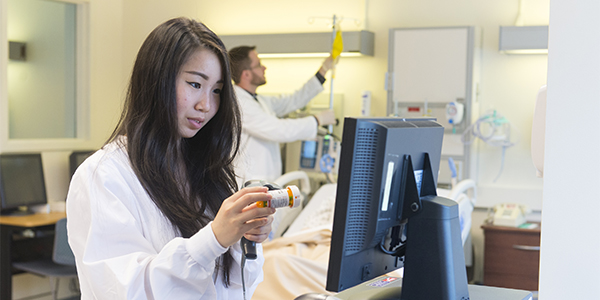SUNY and Binghamton research grants awarded to pharmacy faculty
Sarah Lynch, Wesley Kufel and William Eggleston garner awards to develop medical record project, bacteria management and opioid center.

Lynch receives SUNY grant
Sarah Lynch, director of skills education and clinical assistant professor of pharmacy practice at Binghamton University’s School of Pharmacy and Pharmaceutical Sciences, has received a $20,000 SUNY Innovative Instruction Technology Grant (IITG) to create an electronic medical record for the classroom.
The competitive IITG program is open to SUNY faculty and support staff across all disciplines and encourages development of innovations that meet the Power of SUNY’s transformative vision. Recipients will openly share project outcomes in the SUNY Learning Commons, enabling SUNY colleagues to replicate and build upon innovations.
The grant will fund a pilot interprofessional educational electronic medical record (EMR) project – ePATIENT: Educational Program Advancing Training in Interprofessional Networked Treatment – that will increase the fidelity of the immersive simulation environment and the number and quality of interprofessional encounters for students in health- and social-care profession programs at SUNY institutions.
“Practicing healthcare professionals often rely on EMRs to gather and document patient information and communicate with other providers,” Lynch said. “However, this skill is not easily translated to the classroom because no educational EMR exists that can allow all members of an interprofessional healthcare team to access a single patient profile and have real-time updates.”
With programming help from Binghamton University’s Information Technology Services, Lynch and her team will develop ePATIENT to allow faculty at SUNY institutions to collaborate and bring team-based learning to students in a way that mimics realistic clinical workflow and enhances communication. “Faculty will develop patient cases that will be housed in the online system, and students will access these cases and react as appropriate for their profession while working as a member of an interprofessional healthcare team,” Lynch said.
Interprofessional education plays an important role in Binghamton’s pharmacy program and ePATIENT will serve as a tool to enhance the realistic nature of these activities while adding the opportunity for students to work remotely on their teams.
The project will start with a small team and two campuses, including Patti Reuther, director of Innovative Simulation and Practice at Binghamton’s Decker School of Nursing, and individuals from the University at Buffalo’s School of Medicine and Behling Simulation Center. Lynch will also have assistance from two co-principal investigators (PIs) from the SOPPS Department of Pharmacy Practice: Erin Pauling, clinical assistant professor, and William Stitcht, skills education technician.
“The vision is that this program will eventually serve as a SUNY-wide platform for healthcare case-based learning and application,” Lynch said.
Lynch is also co-PI for a $20,000 IITG grant awarded to Robert Wahler, a clinical assistant professor at the University at Buffalo, for “Development of a Micro-Credential on the Newly Developed Pharmacist Patient Care Process for Use in Pharmacy and Health Profession Programs: Promoting Patient-Centered Care.”
Kufel garners two grants
Wesley Kufel, clinical assistant professor of pharmacy practice, received a $10,000 grant from the Binghamton University Interdisciplinary Collaboration Grants Program titled “Antibiotic Use for Urinary Tract Infection Prophylaxis Among Residents in Long-Term Care Facilities.” As the program name indicates, it funds work by investigators who seek to enhance their research opportunities through interdisciplinary collaboration.
“Antibiotic use is one strategy for urinary tract infection (UTI) prophylaxis, yet the frequency and impact of antibiotic use for UTI prophylaxis is not well-established,” Kufel said. “The goal of this study is to better characterize the frequency and prevalence of antibiotic use for UTI prophylaxis among long-term care facility residents as well as the antibiotics prescribed for UTI prophylaxis.
“We’ll also aim to evaluate the impact of antibiotic use for UTI prophylaxis on certain clinical outcomes,” he added.
Kufel will work with faculty from the Decker School of Nursing on the study. Gail Rattinger, associate dean for academic affairs and assessment and professor of health outcomes and administrative services, along with Leon Cosler, chair of the Department of Health Outcomes and Administrative Services, will serve as co-PIs with Kufel.
Kufel has also received an American Society of Health-System Pharmacists (ASHP) Foundation New Investigator Research Grant for $19,999, for a study titled “Impact of a Pharmacist-Driven Collaborative Initiative for Staphylococcus aureus Bacteremia Management.”
Kufel holds a faculty appointment at SUNY Upstate Medical University as a clinical assistant professor in the Department of Medicine and practices as a clinical infectious diseases pharmacist at SUNY Upstate University Hospital. Dr. Stephen J. Thomas, MD, professor of medicine and of microbiology and immunology and division chief of Infectious Diseases at SUNY Upstate Medical University in Syracuse, will serve as the senior investigator on the grant.
“Staphylococcus aureus is associated with considerable morbidity and mortality,” Kufel said. “Our goal is to improve Staphylococcus aureus bacteremia management through implementation of an evidence-based bundle and mandatory infectious diseases consultation through a pharmacist-driven collaborative initiative. The impact of this initiative on clinical outcomes will also be evaluated.”
Eggleston collaborates on grant for new opioid research center
William Eggleston, assistant clinical professor of pharmacy practice, is coordinating establishment of an opioid research center with Eric Hoffman, professor of pharmaceutical sciences and associate dean for research. The center will be a collaborative effort between Binghamton and SUNY Upstate Medical University in Syracuse, N.Y., with the goal of creating a multi-institutional center — the Opioid Research Center for Central New York — that can look at both clinical and research aspects of the opioid epidemic.
Initial seed funding of $48,000 has recently been awarded from a SUNY Center-Scale Proposal Planning and Development Grant and there are many interested collaborators on the Binghamton campus and in the community.
